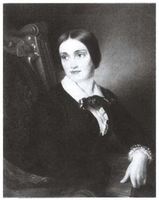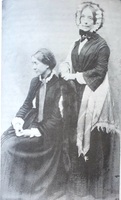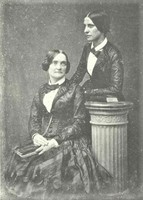Petition "To the Laws of Property as They Affect Women," Feb 16, 1856
Dublin Core
Title
Subject
Description
Credit
The Carlyle Letters Online/CLOSource
Publisher
Type
Article Item Type Metadata
Text
THE LAWS OF PROPERTY AS THEY AFFECT WOMEN
A Petition for which the Signatories of Women are requested.
Sheets of this Petition are lying for Signature at Messrs. Chapman and Hall, 193, Piccadilly; Messrs. Smith and Elder, 65, Cornhill; Mudie’s Library, New Oxford-street; Messrs W. and E. Cash, Publishers, Bishopgate-street, and Mr. C. Fox’s, Paternoster-row.
HUMBLY SHEWETH,—That the manifold evils occasioned by the present law, by which the property and earnings of the wife are thrown into the absolute power of the husband, become daily more apparent. That the sufferings thereupon ensuing, extend over all classes of society. That it might once have been deemed for the middle and upper ranks, a comparatively theoretical question, but is so no longer, since married women of education are entering on every side the fields of literature and art, in order to increase the family income by such exertions.
That it is usual when a daughter marries in these ranks, to make, if possible some distinct pecuniary provision for her and her children, and to secure the money thus set aside by a cumbrous machinery of Trusteeship, proving that few parents are willing entirely to entrust the welfare of their offspring to the irresponsible power of the husband, to the chances of his character, his wisdom, and his success in a profession.
That another device for the protection of women, who can afford to appeal, exists in the action of the Courts of Equity, which attempt within certain limits to redress the deficiencies of the Law; but that trustees may prove dishonest or unwise in the management of the funds entrusted to their care, and Courts of Equity may fail in adjusting differences which concern the most intimate and delicate relation of life;—that legal devices, patched upon a law which is radically unjust, can only work clumsily, and that here, as in many other departments of justice, a clearance of the ground is the chief thing necessary. That, since this is a truth, which has gradually come to be recognised in regard to protective restrictions upon trade, to titles of property in land, and to the legal machinery for conveying such property from one owner to another, &c., we would hope that before long it will also come to be recognised in matrimonial legislation.
That it is proved by well-known cases of hardship suffered by women of station, and also by professional women earning large incomes by pursuit of the arts, how real is the injury inflicted.
That whereas it is customary in manufacturing districts to employ women largely in the processes of trade, and as women are also engaged as sempstresses, laundresses, charwomen and in other multifarious occupations which cannot here be enumerated, the question must be recognised by all as of practical importance.
That newspapers constantly detail instances of marital oppression, "wife-beating," being a new compound noun lately introduced into the English language, and a crime against which English gentlemen have lately enacted stringent regulations.
But that for the robbery of a man of his wife’s hard [won] earnings there is no redress—against the selfishness of a drunken father, who wrings from a mother her children’s daily bread there is no appeal. She may work from morning till night, to see the produce of her labour wrested from her and wasted in a Gin Palace, and such cases are within the knowledge of every one.
That the law, in depriving the mother of all pecuniary resources, deprives her of the power of giving schooling to her children, and in other ways providing for their moral and physical welfare; it obliges her, in short, to leave them to the temptations of the street, so fruitful in juvenile crime.
That there are certain portions of the law of husband and wife which bear unjustly on the husband, as, for instance, that of making him responsible for his wife’s debts contracted before marriage, even although he may have had no fortune with her. Her power also after marriage, of contracting debts in the name of her husband, for which he is responsible, is too unlimited, and often produces much injustice.
That in rendering the husband responsible for the entire maintenance of his family, the law expresses the necessities of an age, when the man was the only money-getting agent; but that since the custom of the country has
That the laws of various foreign countries are in this respect much more just than our own, and afford precedent for a more liberal legislation than prevails in England—and your Petitioners therefore humbly pray that your Honourable House will take the foregoing allegations into consideration, and apply such remedy as to its wisdom shall seem fit—
Anna Blackwell; Isa Blagden; Elizabeth Barrett Browning; Sarianna Browning; Mrs. Cowden Clarke; Charlotte Cushman; Amelia B. Edwards; Eliza F. Fox; Mrs. Gaskell; Matilda M. Hays; Mary Howitt; Anna Mary Howitt; Mrs. Jameson; Harriet Martineau; Honble. Julia Maynard; Mary Mohl; Bessie Rayner Parkes; Mrs. Reid; Miss Sturch; Mrs. Carlyle; Miss Jewsbury; Mrs. Lovell; Mrs. Loudon; Miss Leigh Smith.






